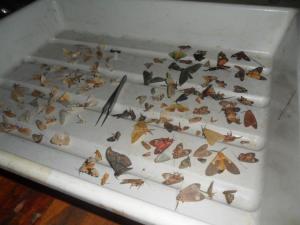Something that caught my eye this week was the BBC 4 documentary, “Can eating insects save the world?” Gastronaut Stefan Gates goes on a journey through famous insect eating hotspots of the world, and takes a first-hand look at the growing market for edible insects. 80% of the world’s population already enjoy insects either as a delicacy, or as an everyday staple – so why don’t we? The programme focusses on whether we can overcome cultural barriers to utilise this abundant and environmentally friendly food source.
Meat is very important to most people’s diets in the west, but comes at a huge cost to conservation, – 70% of all agricultural land is used for rearing livestock. This is a hugely inefficient process – for every 10kg of feed put into livestock, just 1kg of beef can be produced, compared to 9kg of insects, which uses a much smaller proportion of land!
The need for land to rear livestock also often comes at a cost to biodiversity. For example, in Brazil, the world’s leading exporter of beef, over 60% of deforestation of the Amazon made way for cattle pastures. This not only has a direct cost on biodiversity in the Amazon, but goes on to have numerous environmental impacts throughout the process of rearing and exportation. The inefficient way in which large herbivores such as cows eat, means that much of what the livestock are fed is lost as waste. This process also produces ammonia and greenhouse gases which are detrimental to the environment, as they can have an effect on natural processes. More such pollutants are produced when the meat is then shipped large distances to reach its market overseas. Conversely, the documentary showed us a small cricket farming business in Thailand, which could turn over huge numbers of crickets, at tiny costs, thanks to the speed of reproduction and fast growing rates of the insect.

Could this ever be considered a tasty dinner?! Photo taken on a recent biodiversity field trip to the Ugandan rainforest!
Furthermore it takes 2393 litres of water to produce just one hamburger! Water conservation is a hugely important topic this year, as it’s the United Nations international year of water cooperation. Freshwater is a valuable resource which we must manage wisely in order to secure adequate supplies for future generations. Switching our diet to include less water consuming sources of protein such as insects could greatly reduce agricultural pressures on freshwater.
There are over 6 million species of insect, which vary in nutritional benefits. Crickets are high in calcium, termites in iron, and just 100g of giant silkworm could fulfil your daily requirements for thiamine copper iron zinc and riboflavin! With such a wide variety to choose from, you’ll never complain of having to eat the same thing all the time ever again! The documentary does a great job of showing the delight which many people take in indulging in an insect snack, with the story of the children in Cambodia who go hunting for tarantulas underlining how important insects could be as a source of protein in poorer nations. However, this isn’t just a case of eating to survive – they love the stuff!
By switching just a small percentage of traditional meat consumption to insect consumption we could potentially prevent further deforestation, reduce pollutants, and feed more people at a much lower cost – so why not?!
The largest problem to overcome in the west is the mental barrier at the idea of eating bugs. To most people, it’s just gross. They look strange, and they have too many extra bits sticking out. Ironically almost everyone is already eating around 500g of insect per year. This is explained by Marcel Dicke, a strong proponent of eating insects, in the inspiring TED talk posted below. (He also has a really cool T-shirt). Pretty fruit and vegetables are sent to supermarkets and sold whole, but those with insects are pulped and used to make processed foods! In fact in every 100g of chocolate, there are up to 60 insect components! He also makes the valid point that other weird looking things like crabs and shrimp are considered delicacies, although essentially just insects of the sea.
So, with all these arguments in favour of insects as a sustainable, efficient, and tasty food source, and even the full backing of the FAO, it seems to me that making them a larger part of our diets is not a question of if, but of when – and having watched the video below, I’m eager to get my hands on some!
Related articles
- Want To Solve World Hunger? Eat Insects (telegraph.co.uk)
- Should we learn to love eating insects? (guardian.co.uk)
Recent Comments